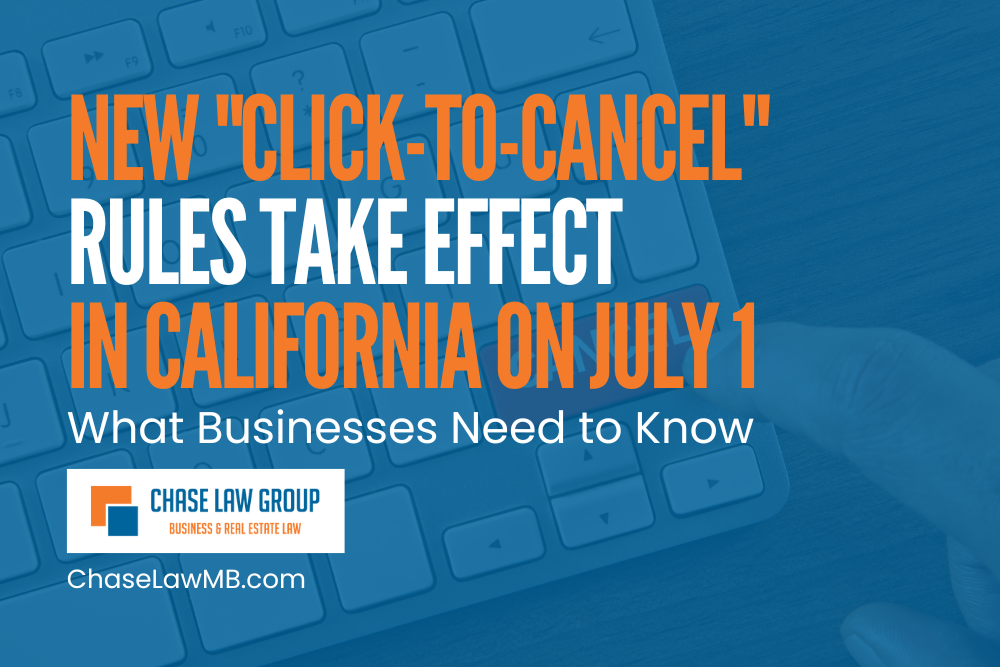New “Click-to-Cancel” Rules Take Effect July 1: What California Businesses Need to Know
By Admin June 24, 2025 Category: Business Law Tags: california business law california law chase law group chase law manhattan beach Click to cancel Consumer Protection deann chase los angeles business attorney small business law Subscription services

California and the Federal Trade Commission (FTC) have updated their auto-renewal rules to better protect consumers from so-called “negative option” programs—subscriptions or services that continue until the customer cancels. If your business charges customers on a recurring basis, you need to review your business contracts for these changes. Failure to comply can result in enforcement actions, fines, and reputational damage.
Starting July 1, 2025, California’s updated Automatic Renewal Law requires businesses that offer recurring subscriptions online to make cancellation as easy as enrollment—literally a “click-to-cancel” mechanism.
This is what you need to know.
California Requirements (Effective July 1, 2025)
- Clear Disclosures: Must clearly present material terms (price, frequency, cancellation process) before collecting payment info.
- Affirmative Consent: Customers must actively agree to recurring charges; passive opt-ins are not valid.
- Post-Signup Confirmation: Send a confirmation summarizing key terms and how to cancel.
- Applies To: New, amended, or extended contracts after July 1, including free trials that convert to paid subscriptions.
- Recordkeeping: Keep proof of consent for at least 3 years.
- Cancellation Method: Must allow cancellation via the same method used to enroll (online, phone, etc.).
- Click-to-Cancel Rule: Online cancellations must include a visible “click to cancel” button—even when offering discounts. Phone cancellations must be available at any time.
- Required Reminders:
- Renewal/change notices: 7–30 days in advance
- Annual renewal reminders (regardless of term length)
The New FTC Rule (Effective July 14, 2025):
- No Misleading Terms: Prohibits false or unclear subscription details.
- Clear Disclosures: Must explain recurring charges, timing, and cancellation before collecting payment info.
- Informed Consent: Requires standalone, express consent—retain proof for 3 years.
- Easy Cancellation: Must be as simple as signing up (e.g., online “click-to-cancel” without speaking to a rep).
- Immediate Stop: Charges must end immediately upon cancellation.
This rule applies broadly, covering offers made through online, telephone, in-person, and written channels therefore, cancel buttons need to be visible and phone calls or long surveys or hold times are not permitted in order to cancel.
What Your Business Needs to Do
- Audit Your Process: Make cancellation as simple as signup—especially online. One or two clicks should do it.
- Review Disclosures: Ensure terms clearly state recurring charges and are presented before payment info is collected.
- Get Clear Consent: Passive checkboxes aren’t enough—customers must actively agree.
- Send Confirmations: Provide a receipt or email summarizing terms and how to cancel.
- Track & Notify: Monitor trial periods and send required renewal or change notices.
- Train Your Team: Make sure all staff understand and follow the new rules.
Final Thoughts
Consumer protection laws are evolving rapidly to match digital commerce trends. As a business, your best strategy is transparency and simplicity, but noncompliance can lead to severe penalties.
If you’re unsure whether your current contracts comply with these new laws, contact us. It’s better to fix a small issue now than face a large enforcement action later. For help reviewing your current contracts, let’s connect. Contact Chase Law Group.
We’re here to help you review your business contracts and ensure compliance with the latest regulations.
WWW.CHASELAWMB.COM
Contact Chase Law Group
310-545-7700
Please note that this article is for informational purposes only and should not be considered legal advice and does constitute an attorney-client relationship. It is recommended to consult with an attorney directly for specific guidance pertaining to your business and its practices.

